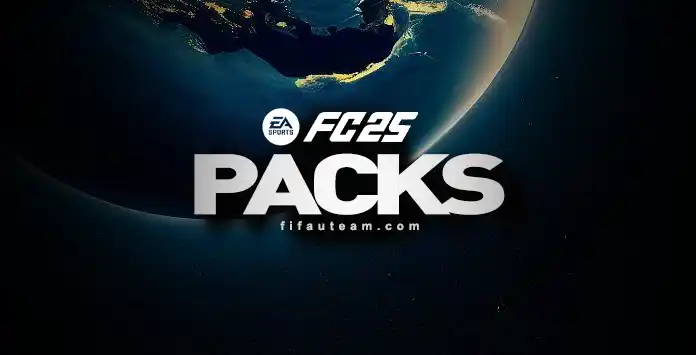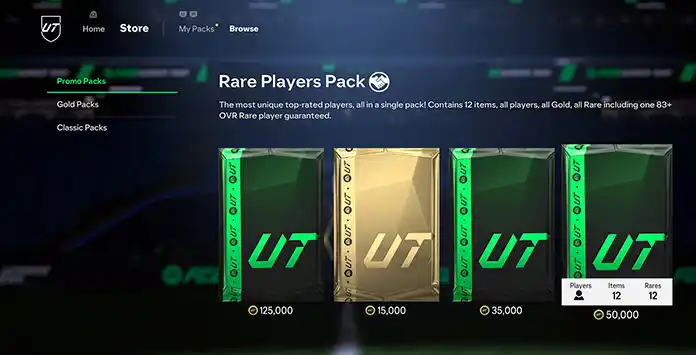FC 25 ULTIMATE TEAM PACKS
If there’s one aspect of the game that players know the least about, it’s how packs work.

How do FC 25 Ultimate Team Packs Work?
Packs are a central feature of FC Ultimate Team, captivating players with the thrill of opening them and the potential for acquiring top-tier cards. The appeal of packs lies in their unpredictability and the excitement they generate through flashy lights and sounds during the pack-opening process.
This spectacle entices players to keep returning to the game, contributing to the significant increase in the number of cards available by the end of the game’s cycle. While the fanfare of pack openings is well-known, what remains intriguing is the mechanics behind how packs are constructed and the factors influencing their contents.
The database of players in FC 25 Ultimate Team is vast, making it challenging to pack a specific player even if the odds were evenly distributed. Packs that contain more players inherently offer better chances of obtaining a high-quality card. Additionally, packs that feature only rare items decrease the pool of potential players by about 66%, theoretically tripling the likelihood of securing a desirable card.
There is speculation that EA can manipulate pack weights for specific accounts, a capability that would be simpler to implement than other rumored mechanics like scripting or handicapping. However, while this manipulation is plausible, it remains unconfirmed and adds another layer of mystery to the allure and frustration of Football Club Packs.

How are UT Packs Made?
When discussing Packs in FIFA Ultimate Team, it’s essential to focus on players since they are the most sought-after items. Considering each player in the database has a percentage chance assigned to them, let’s simplify and assume this number is the same for everyone. By narrowing it down to players rated 75 and above (gold players), we can estimate the odds. With approximately 2,500 gold players when the game is released, each player would theoretically have a 0.04% chance of being packed if all odds were equal. However, we know that the chances are not equal, as higher-rated cards generally have a lower percentage chance of being selected, although this rule is not absolute.
For instance, despite having the same rating, some players have vastly different prices and price ranges on the transfer market. This disparity is likely due to the popularity of certain leagues, making players from more popular leagues more challenging to pack. Even compared to higher-rated players from less popular leagues, players from popular leagues are still more difficult to obtain. Thus, the rarity of a card is influenced not just by its rating but also by factors such as league and club popularity. EA likely uses football knowledge and data on how frequently players are packed and listed on the market to adjust pack odds, making certain desirable players less common in packs.
FC 25 Ultimate Team Packs likely use a Random Number Generator (RNG) to determine the rating of the player you will pack. For example, a number between 0 and 100 might be used, with different ranges corresponding to different rating groups. If the RNG lands between 0 and 80, you get a player rated 75-82; between 80 and 96, you get a player rated 82-84; and between 96 and 100, you get a player rated 84 and above. Once the rating group is determined, another RNG selects the specific player. Desirable players might have fewer values assigned, making them rarer. For instance, one player might be assigned numbers 0-49, while another might be assigned 50-59, making the first player five times more likely to be packed.
This method is speculative but inferred from observed pack odds and player distributions. EA might use other methods to assign players to packs, but the store percentages hint at this structured approach. The large number of players in the game means even equal odds make specific players hard to pack, explaining why getting a high-rated walkout player is rare. Additionally, certain players appear more frequently during walkouts, suggesting that less desirable players are more common due to their lower demand and market value. This pattern supports the idea that EA selects pools for each card before choosing the specific player.

Which Packs are Best?
When analyzing the effectiveness of Ultimate Team packs, it’s evident that packs containing a greater number of players generally yield better returns. This is because packs with more players offer a higher chance of obtaining valuable cards. Consumables, while necessary, typically don’t excite players as much as high-rated players do. Therefore, packs with a larger quantity of rare players are more desirable since all the best players in the game are classified as rare.
To illustrate, consider the probability of packing a specific player. In a standard scenario, the chance might be 0.04% if it were equal across all players. However, in packs that only contain rare players, icons, and the current Team of the Week (assuming no promotional events), the odds increase to nearly 0.15%. This means you are about three times more likely to pack a sought-after player from such packs. For example, if you have to choose between opening a single 100k Jumbo Rare Players Pack or 13 Premium Gold Packs, the former gives you better odds. While Premium Gold Packs offer a mix of players and consumables, the Jumbo Rare Players Pack focuses more on players, increasing your chances of pulling a high-rated card.
The principle behind this can be compared to a simple probability scenario. Imagine a hat with three balls: two white and one red. If picking the red ball wins you a prize, you initially have a 33.3% chance of winning. If you don’t win and you pick again after returning the first ball to the hat, your chances remain the same. However, if you pick two balls consecutively without replacement, your odds improve with each draw. This analogy reflects how larger UT packs work. If the first player selected isn’t a top-tier player, the subsequent draws have slightly better odds of selecting one, as players cannot be repeated within the same pack.
Despite the improved odds with larger packs, the overall chance of packing a high-rated player remains slim, akin to winning the lottery. Higher ranks in Squad Battles, Division Rivals, and Champions offer packs with more players and rare cards, aiming to reward players with better chances of packing valuable cards. Although it can be frustrating to put in significant effort and not get a top player, the nature of chance and probability means that even with improved odds, the likelihood of packing the best players remains low, maintaining the excitement and challenge of the game.

Do EA Manipulate Pack Odds?
We’re not really sure if packs from certain Squad Building Challenges (SBCs) or rewards in FUT give better stuff. Sometimes people say they got amazing things from them, but it’s hard to know for sure. It’s like trying to figure out if it’s going to rain just because it rained one time when you went outside. That’s not enough information to make a good guess. We need more data to understand what’s really going on with these packs.
Regarding EA’s potential manipulation of pack odds, speculation abounds. It’s conceivable that they adjust the odds for packs obtained through SBCs or rewards, as these untradeable packs serve to withdraw valuable cards from the market. By rendering these cards untradeable, EA effectively limits their impact on the in-game economy, incentivizing players to purchase FC Points to access tradeable packs instead. While there is no concrete evidence to support this theory, the logic behind it is compelling.
However, without comprehensive data and transparency from EA, reaching definitive conclusions about pack odds manipulation remains elusive. While the gaming community could theoretically collaborate to gather and analyze data, such an endeavor would be unprecedented in scale and coordination. Until then, the mystery surrounding Ultimate Team pack odds and potential manipulation by EA persists, leaving players to navigate the uncertainties of chance and probability in pursuit of coveted in-game rewards.

Do EA Manipulate Players Accounts?
The speculation surrounding whether EA manipulates certain players’ accounts to grant them better pack luck has stirred debate within the gaming community. While discussions often lack concrete evidence, they raise intriguing questions about the mechanisms behind pack probabilities. The notion that EA might favor specific accounts to incentivize pack purchases has sparked curiosity. Some argue that instead of implementing complex algorithms to influence gameplay, it would be simpler for EA to grant favorable odds to influential personalities within the gaming community. This perspective suggests that by catering to a select few, EA indirectly influences a broader audience to engage in pack openings, driven by the allure of better rewards.
Despite assertions from some quarters that manipulating individual pack odds would be logistically challenging, others remain skeptical. They point to instances where EA has intervened to rectify player grievances, such as restoring accidentally discarded items or compensating for technical issues. These examples underscore EA’s capability to exert control over player accounts, potentially extending to pack probabilities. From a technical standpoint, it’s plausible that EA could adjust the likelihood of obtaining high-rated players for specific accounts. The ability to tailor pack outcomes based on individual account histories raises intriguing possibilities about the extent of EA’s influence over pack openings.
While the concept of manipulated pack odds remains speculative, it’s essential to recognize the broader context of player engagement within the gaming ecosystem. Influential figures within the gaming community often wield considerable influence, with their experiences shaping broader player perceptions. As such, the perceived prevalence of favorable pack outcomes among certain accounts may serve as a potent marketing tool, encouraging increased pack purchases and sustained player engagement. Ultimately, the debate surrounding EA’s purported manipulation of pack odds underscores the complexities inherent in modern gaming ecosystems, where player experiences and developer interventions intersect in intricate ways.
This ongoing discourse highlights the need for transparency and accountability in gaming practices, ensuring that players are empowered with accurate information about the mechanics shaping their gaming experiences. As the gaming landscape continues to evolve, it’s crucial for developers and players alike to engage in open dialogue, fostering a collaborative environment that prioritizes fairness and integrity. By addressing concerns and implementing measures to enhance transparency, developers can cultivate trust and goodwill among their player base, fostering a healthier and more sustainable gaming ecosystem for all stakeholders involved.